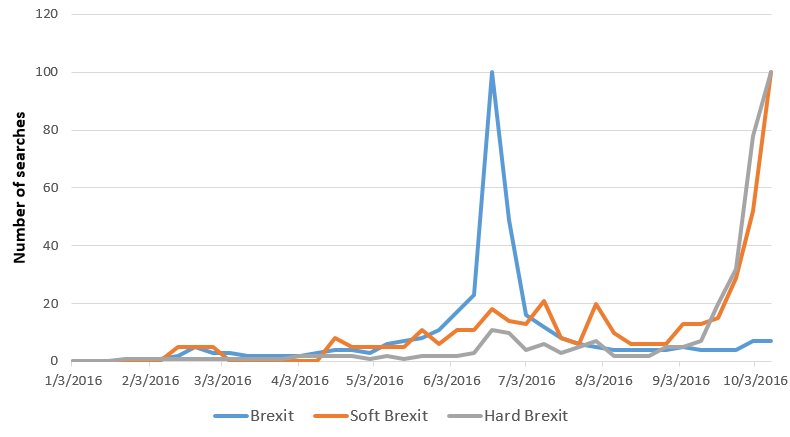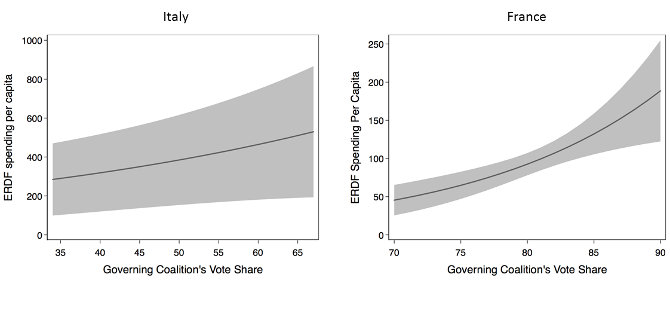 Theresa May has rejected calls for the UK parliament to have a vote on the terms of Brexit, however on 12 October she accepted that there will be an opportunity for parliament to debate the country’s strategy before Article 50 is triggered. Valentino Larcinese states that the argument against parliament having a strong role in the process rests on a decidedly misguided notion of the ‘will of the people’ and that UK citizens deserve adequate deliberation and decision-making procedures to determine the way forward following the referendum result.
Theresa May has rejected calls for the UK parliament to have a vote on the terms of Brexit, however on 12 October she accepted that there will be an opportunity for parliament to debate the country’s strategy before Article 50 is triggered. Valentino Larcinese states that the argument against parliament having a strong role in the process rests on a decidedly misguided notion of the ‘will of the people’ and that UK citizens deserve adequate deliberation and decision-making procedures to determine the way forward following the referendum result.
According to Britain’s Prime Minister, Theresa May, giving the UK’s Parliament a vote on Brexit plans will “thwart the will of the British people”. As political science and political economy students usually learn during week 1 or 2 of their courses, this statement makes no sense. A well-established literature in social choice theory, of which Kenneth Arrow’s impossibility theorem is probably the most important result, shows that unfortunately the “will of the people”, British or otherwise, does not exist.
Brexit and the ‘will of the people’
It is difficult enough even to define and understand the desires of single individuals, as shown very clearly by recent advances in behavioural economics. But let’s ignore this complication and let’s assume that everybody in a polity (say the UK) has well defined preferences, is well informed and it is a fully rational person. Let’s even concede that these preferences remain stable over time.
These assumptions, unrealistic as they are, are nevertheless insufficient to result in collective rational preferences. In other terms it is impossible to aggregate individual preferences into a rational “will of the people” if we want to give a fair representation to all views and opinions in society (i.e. no dictatorships) and we also think that people should be entitled to have any views they want. The debate on Brexit (or any other matter) would then be a better debate if it could avoid metaphysical representations that portray multiple individuals as a single entity.
William Riker, one of the most prominent 20th century political scientists and one of the founders of the rational choice approach to politics, famously used Arrow’s results to distinguish between a populist and a liberal view of democracy. In the populist view, democracy tries to aggregate the desires of individual members of a society into a collective will (like Theresa May would claim has happened with the Brexit referendum). In the liberal view the purpose of democracy is rather to keep elected representatives held to account.
These representatives do not deliver the public will (which does not exist), but must respond to the public for their choices according to some pre-defined procedures. We do not necessarily have to agree with Ricker, but still the problem remains of how to take collective decisions and how to interpret these decisions once they are taken. After all, democratic regimes also allow referendums, whereby decisions on some matters are directly taken by the voters: referendums might not deliver the people’s will but, once we agree that this is a good procedure, then the outcome should be respected.
May’s theorem
There is one insight in social choice theory which could support Theresa May’s approach to Brexit. This is called May’s theorem and is named not after the current Prime Minister, but rather after the American mathematician Kenneth May who proved the theorem in 1952. It is also useful to clarify that the other famous theorem “I am the Prime Minister therefore I am right” has nothing to do with it.
The theorem suggests that, in binary choices (i.e. when we have only two alternatives), majority voting is the best system and the only one which satisfies a number of desirable properties. On 23 June the choice was binary (Leave or Remain) and therefore the outcome of that referendum, which has been reached using the best possible rule, gets us as close as possible to the metaphysical idea of the “will of the people”.
But while May’s theorem could be used as the foundation for Theresa May’s “will of the people”, we have now learned that there are at least two versions of Brexit, hard and soft, which only came to the forefront of public debate after the referendum, as shown by the graph below reporting the weekly frequencies of Google searches on “Brexit”, “Soft Brexit” and “Hard Brexit” in the UK. The blue (“Brexit”) spike refers to the referendum week. It is only in September that a clear awareness seems to have emerged of the existence of at least two possible Brexit options.
Figure: Weekly number of searches for “Brexit”, “Soft Brexit” and “Hard Brexit” on Google

Source: Google Trends
Had the Remain camp won the contest we would have probably learned that there was more than one Remain option too. So what has happened is that a complex multidimensional choice has been reduced by the referendum to only two options: the consequence is that a choice has been made but it’s not clear which one. Note that if this was not the case, any discussion of hard or soft Brexit would be superfluous: the referendum outcome would provide by itself an indication of what should be done now. Good bye May, we are back in Arrow’s world!
The importance of institutions
One of the key insights in Arrow’s theorem is that institutions matter: when three options or more are available, different procedures can induce the same society (with exactly the same individuals) to take different decisions on the same matter. We might, for example, end up with a different government depending on whether we use a first past the post or a proportional electoral system. We need to acknowledge this unpleasant characteristic of collective decision-making: there is nothing divine about these rules and about the decisions which are taken using them. The best we can hope for is that everybody (or at least a qualified majority of citizens) agrees on the rules themselves irrespective of the outcome that they deliver.
This is the reason why most constitutions provide a bias in favour of the status quo when it comes to issues of extreme importance, like amending the constitution itself. While ordinary policy is normally taken by simple majority rule, constitutional changes require more complex procedures. These procedures typically create a status quo bias both to protect minorities against a “tyranny of the majority” and to make it more likely that the changes have been carefully evaluated, possibly by different independent players. Broad coalitions must then be formed to pass a constitutional change.
Amendments to the US constitution, for example, must be voted by two thirds of both the House and the Senate and must then be approved by three quarters of the 50 state legislatures. In Italy there will soon be a referendum on a major constitutional reform. This reform has already been passed twice by the parliament (with a “reflection pause” of at least three months between each vote).
In comparison, it is quite extraordinary to observe the levity of the Brexit decision-making process, ever since Cameron committed to a referendum. Brexit is no less important that a major constitutional change (except maybe that it is more costly) and yet, following a consultative referendum, it now seems to be taken as an accomplished, inevitable outcome, which only needs to be implemented (if only we knew how). Brexit is “the will of the British people”, the contemporary correspondent of the divine will in the ancient regime.
Such misunderstandings as to the interpretation of the outcome of the referendum can emerge for many reasons, including short-term political opportunism, but there are at least two other reasons worth discussing. The first is the somewhat naïve view that democracy is the simple implementation of majority rule and that the referendum has enabled us to discover the “will of the British people”. Unfortunately, the absence of written constitutional rules has allowed this simplistic view to become prevalent.
The second reason stems from the gravy train which Brexit is creating in Whitehall. There are few things which are more desirable for politicians than being able to expand their influence by distributing jobs and perks. So far two new departments have already been created specifically to deal with Brexit and they have hired (or poached from other departments) hundreds of civil servants. It is now anticipated that the Brexit ministry will need to double its size and one wonders how many times it will have doubled before Brexit is accomplished.
Outside of these departments, it is hard to think of any area of public administration that will remain unaffected by Brexit. The civil service will have to expand, hiring thousands of new employees who will spend their days reviewing EU laws and the ways they currently affect the British legal and regulatory system, preparing material for negotiations with the EU and for the individual new trade deals that will have to be struck with dozens of countries, delving into the intricacies of fisheries, agriculture, financial services and virtually every other sector of the British economy.
Armies of external consultants will be hired and paid thousands of pounds per unitary day of work. Nobody knows the impact of this process on the UK budget but, over the many years that the process will take, it could easily add up to billions of pounds. In brief, for politicians Brexit is a rare opportunity to expand and shape public administration. If a populist view of democracy seems to reflect the current prevalent mood in the British public, the gravy train might have its appeal for decision-makers.
It should be clear at this point that allowing parliament to vote on Brexit plans will not thwart the will of the British people. Yes, a referendum has taken place and, whatever its interpretation, there is no doubt that its outcome must be respected. At the same time, however, taxpayers’ money, people’s jobs and more generally the prosperity of this country also deserve respect.
This does not mean that the outcome of the referendum should be ignored – I would never claim this – but simply that the people of this country deserve adequate deliberation and decision-making procedures to determine what has to be done now. It would be paradoxical if the parliament was not part of this process since one of the most important arguments in favour of Brexit concerned precisely the sovereignty of Westminster against the technocracy of Brussels. Even more paradoxical is the fact that the government intends to interpret the outcome of the referendum as a mandate to do pretty much what they like.
Please read our comments policy before commenting.
Note: This article gives the views of the author, and not the position of EUROPP – European Politics and Policy, nor of the London School of Economics.
Shortened URL for this post: http://bit.ly/2dw3fL3
_________________________________
 Valentino Larcinese – LSE
Valentino Larcinese – LSE
Valentino Larcinese is Professor of Public Policy in the Department of Government at the London School of Economics.






I am interested in Food Sovereignty issues and related issues. I voted to remain because of the Government’s deregulation agenda. I did this even though I was in the separate the issues camp. I also did this despite short comings of EFSA – The European Food Standards Agency (please see Corporate Europe Observatory EFSA Revolving doors).
The Science Select Committee were quick off the mark following the Brexit vote. Some of the evidence coming in is poor and an academic embarrassment/disaster. I am generalising.
Please would the author leave a comment below if he would like me to send him evidence of my allegations directly in an email.
https://www.parliament.uk/business/committees/committees-a-z/commons-select/science-and-technology-committee/news-parliament-2015/leaving-the-eu-inquiry-launch-16-17/
Blog from a man who does not mince his words:
https://tompride.wordpress.com/2016/10/11/brexit-is-about-deregulation-not-immigration-an-open-letter-to-leavers/
As we speak a nurse is on hunger strike outside the DOH (apparently).
Use it or loose it Brexiters! Trump or Hilary may be the new EU. Now what are we going do?
Campaign to Protect Rural England I think basically said Britain isn’t up to the job of revising regulations. (I am generalising)
Too long, didn’t read. The academic jargon seems superfluous when you’re basically repeating what literally everybody is saying in every media across Europe: “we don’t know what Brexit means”.
Now anyone who is honest about it and does not try to hide from reality very well knows what Brexit means, and what voters intended: a halt to immigration, including European immigration. Hard Brexit, that is. Get over it. It’s ugly, we might not like it, but this sophisticated attempt to subvert the essence of democracy seems even more dangerous to me.
if you didn’t read then you shouldn’t comment
Sorry I was being sarcastic (shouldn’t have been), I did read the article. What I meant was: nobody will read an article that repeats what everybody says in a more complex language. And the angry tone is not against you, it’s just that people voted this way because they were angry and denying them agency is making them even more angrier. Saying the will of the people does not exist (when you just disagree with them) angers people to a dangerous degree.
Perhaps it would be fair to say that the phrase “Will of the people” is a proxy for c.52% of the vote to leave in the EU Referendum. The phrase “The will of a clear but slim majority of those entitled to vote” is too wordy.
I really do not get this stuff about unwritten constitutions and the supposed conflict between the will of the people and Parliament.
The British constitution is perfectly accessible to any who trouble to study it. It’s lack of strict codification is what enables it to evolve and absorb new practices. Referenda are relatively new practices and Brexit will in due course be an exemplar that will inform future practice. Current events are also holding a light to the long established convention that foreign treaties are a matter for the executive.
I think it very unlikely the Courts will overthrow such a convention because powerful legislatures are not necessarily briliant at treaty making (see US Senate) and Courts even less so. Neither will a conflict between the executive and Parliament assist because the executive is embedded in Parliament. Theresa May can exercise Article 50 because she is Prime Minister. She is Prime Minister because she commands Parliament. Parlaiment can debate Article 50 or any other aspect of Brexit but unless a faction can bring down the government then it matters little. Parliamentary opposition to Brexit isn’t going to be very important until there is a need for positive legislation.
Robert, to the extent that the EU Referendum is ever a future example of referendums, let’s hope it is something to be learned from. On 1 September 2016, the Electoral Reform Society launched its report into conduct of EU referendum
Katie Ghose, Chief Executive of the Electoral Reform Society, said:
“This report shows without a shadow of a doubt just how dire the EU referendum debate really was. There were glaring democratic deficiencies in the run-up to the vote, with the public feeling totally ill-informed. Both sides were viewed as highly negative by voters, while the top-down, personality-based nature of the debate failed to address major policies and issues, leaving the public in the dark.
The Electoral Reform Society calls for:
“a root and branch review of referendums, learning the lessons of the EU campaign to make sure the mistakes that were made in terms of regulation, tone and conduct are never repeated.”
The report makes nine key recommendations to improve the conduct of future referendums. These include:
•Tasking an official public body to intervene when misleading claims are made by the campaigns
•Ofcom to conduct a review into an appropriate role for broadcasters to play in referendums
•Early publication of a definitive rule-book to govern campaign conduct, followed by a minimum six-month regulated campaign period
•Extending votes at 16 UK-wide, following its ‘huge success’ in energising the Scottish referendum
•A robust role for the public at every phase – from a citizens’ panel tasked with pre-legislative scrutiny of any referendum bill, through to publicly-funded resources to stimulate citizen-led debates and deliberation across the UK
A link can be found here to the report: http://www.electoral-reform.org.uk/press-releases
I enjoyed this article. I would be interested to hear more specifics about what you mean by respecting the outcome of the referendum, please. Is it possible to respect the outcome without leaving the EU? eg by instead trying to address the issues raised in the campaign around say border control whilst staying in the EU. I wasn’t sure if that was what you might possibly be suggesting, but I don’t think you are. I think you are saying respect the outcome by leaving, but Parliament needs to be involved sooner rather than later in a debate about what sort of relationship and exit we ought to be looking for eg soft, hard or any permutations of those.
Thank you for a rather brilliant essay. I came across this today, following the Supreme Court decision, and finding myself rather irritated by the report of a UKIP MP accusing a LibDem MP of attempting to thwart the “will of the people”, and wondering whether such a phrase had any real meaning or value. I googled it, and found exactly what I was looking for. This articulates beautifully and with authority and erudition what I had thought instinctively – that it is a meaningless concept.
I had never heard of Arrow’s impossibility theorem – thank you for the link. I thought the analysis of hard and soft search terms was an excellent way to illustrate the key problem with trying to decide between highly complex options through a reduction to a dichotomous choice.
The Brexit referendum appears to have been an exercise in collecting a piece of information that no-one knows what to do with, and where whatever avenue is proposed can only ever be one that finds full support with a minority of people, irrespective of the fact that the majority voted “Leave”.